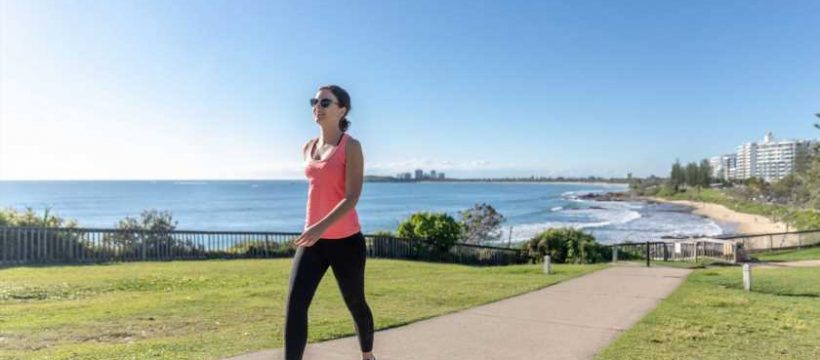Several studies have suggested that walking could combat brain ageing and memory loss and even slow the biological clock – but is one walk a day enough exercise to keep you fit?
Whether it was the easiest form of movement or a way to get some headspace, the past year has shown the benefits of walking in our day-to-day lives. Many of us turned to walking during the COVID lockdowns and by 2021, 60% of people claimed that they would continue to use walking as one of their main ways of keeping fit after restrictions lifted, according to research by activewear comparison site Run Repeat. With walking trends like 12-3-30 and hot girl walk talking over TikTok, it’s clear that our dedication to walking isn’t going anywhere any time soon.
And several scientific studies seem to back up our walking obsession. As 2022 study found that daily walks of at least 8,000 steps a day (regardless of walking pace) could reduce the risk of premature death. Another 2022 study showed that three 15-minute walks a day could significantly improve memory function.
But is a daily stroll really enough to see us through to our weekly exercise goals? And are there any particular techniques you can try to boost the benefits?
We asked Kerry Dixon, personal trainer and founder of The Athlete Method, and Dr Sarah Davies from Panacea Health for their expert insights into this easy and accessible form of exercise.
You may also like
Walking: “How I learnt to reap the mental health benefits of mindful hiking”
What are the benefits of walking?
Kerry believes that walking is seriously underrated. While it isn’t as high intensity as other forms of cardio such as running, “it is effective in its own right, and no matter how fit you are, it is extremely beneficial”. Walking is particularly good for people who suffer from “knee, ankle or back problems”, says Kerry, as it can “reduce pain and improve your circulation and posture”.
There are a whole load of benefits you can get from walking. According to Dr Davies, it can help you “improve your breathing, lower your heart rate, feel happier, become more connected to your environment, and experience less painif you struggle with pain-related health issues.”
And it’s not just about fitness: new research published in the Journal of Alzheimer’s Disease found that brisk walking five times a week helps combat brain aging and memory loss by encouraging blood flow.
How often do you need to walk to get enough exercise?

According to the NHS, adults should be doing “at least 150 minutes of moderate intensity activity a week”. Walking counts towards this weekly exercise goal, and can help you build stamina and improve cardiovascular health – but you have to make sure you’re going at a “brisk” pace. During the exercise, Dr Davies says that “you should feel your heart racing a bit, your breathing should be more laboured, and you should break out into somewhat of a sweat”.
Kerry recommends “a daily walk of at least 30 minutes”. This is the best way to “increase cardiovascular fitness, help to strengthen your bones, and boost muscle endurance and power”. However, Tashi Skervin, a runner, trainer, and founder of fitness bootcamp TSC Method, says that everyone is different. “Someone with quite a sedentary lifestyle will require more movement, whereas someone whose job involves them moving all day won’t need as much to ensure they reach the minimum amount required,” she says.
You may also like
Do you really need to measure your walking pace to reap the cardio benefits?
What technique should you use?
According to Kerry “practising good posture is important” while walking to ensure the exercise is comfortable and efficient. That means you should “keep your head up, lengthen your back, drop your neck and shoulders, and try to engage your core”. You also need to make sure you “swing your arms with each step to create momentum”.
You may also like
Fitness motivation: 6 trainers on how they stay inspired during the festive season
Dr Davies recommends “finding your baseline duration each session”. Your baseline is basically “whatever you can manage without causing problems”, such as losing your form or injuring yourself. She suggests aiming to build from your baseline by at most 8-10% each week, to ensure you keep your “heart, lungs, muscles and other body systems” challenged.
It can also help to vary the intensity of the exercise. Tashi says that “some of your walks could be long and slow, and others can be short and brisk, and this will help to work different energy systems and improve your cardiovascular health”.
Feeling inspired? Join the Strong Women community this June at one of our Strong Women Treks in Epping Forest or the Surrey Hills. The 22km hikes will take you through scenic woodlands and river paths. Book your Trek ticket now.
Image credit: Getty
Source: Read Full Article
